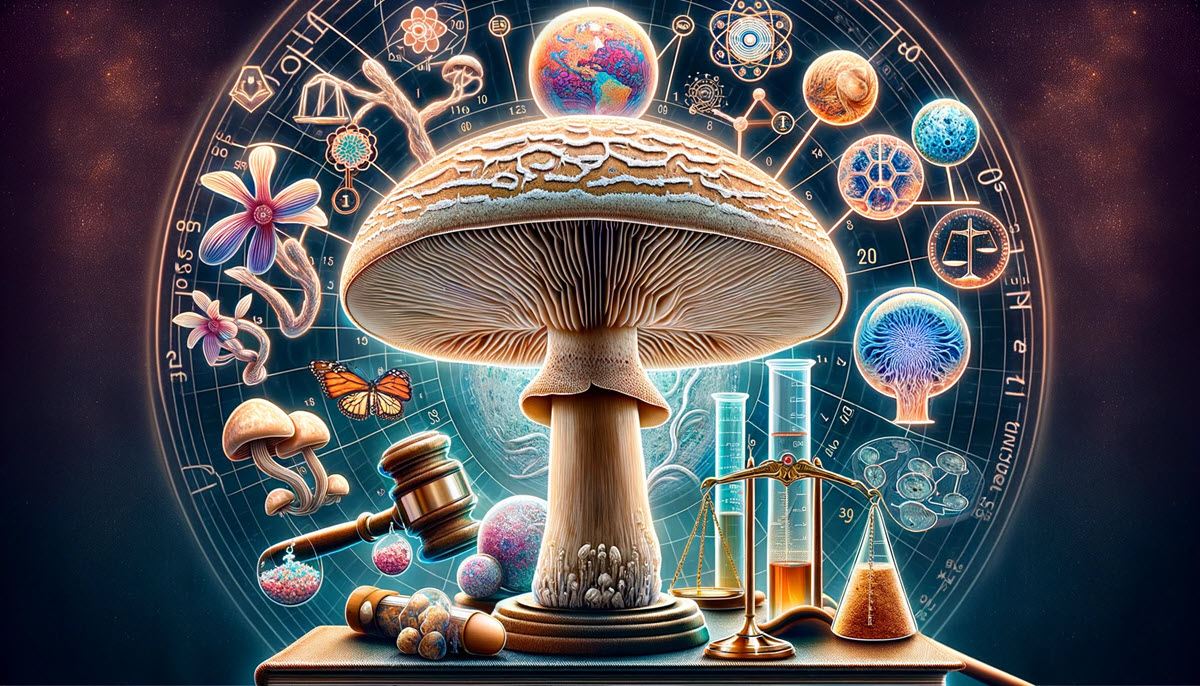Psilocybe cubensis, a species of psychedelic mushroom, has intrigued humans for centuries, weaving its way through various cultures and historical narratives. Known for its profound effects on consciousness and perception, it’s more than just a natural hallucinogen; it represents a bridge to understanding ancient rituals and modern therapeutic potentials. This blog post dives deep into the heart of psilocybe cubensis – a fungus from its origins nestled in earthy forests to its role in today’s quest for mental wellness and spiritual exploration, including mushroom ingestion, fungi cultivation. Whether you’re a curious newcomer or a seasoned mycologist, join us as we explore the fascinating world of this remarkable fungus, shedding light on both its mystical past and promising future.
Key Takeaways
- Psilocybe cubensis, a widely recognized psychedelic mushroom, offers both historical and contemporary significance, highlighting its role in various cultures and modern therapeutic practices.
- The potential health implications of psilocybe cubensis are vast, ranging from mental health benefits in controlled therapeutic settings to risks associated with unsupervised use.
- Legal and safety concerns are paramount when considering the use of psilocybe cubensis, with legality varying by region and safety protocols necessary to mitigate risks.
- Ongoing scientific research into psilocybe cubensis is uncovering its potential for treating conditions such as depression and PTSD, though more studies are needed to fully understand its effects and applications.
- Personal experiences with psilocybe cubensis can vary greatly, emphasizing the importance of setting, dosage, and individual psychological state in determining outcomes.
- It’s crucial to navigate misconceptions about psilocybe cubensis with accurate information and an open mind, as misinformation can lead to misunderstanding its potential benefits and risks.
Understanding Psilocybe Cubensis
Magic Mushrooms Overview
Psilocybe cubensis, often referred to as magic mushrooms, are a species of psychedelic mushroom. They contain the psychoactive compounds psilocybin and psilocin. These mushrooms, a type of fungus whose fruit bodies are known by various names including golden tops, cubes, and gold caps, often grow in fields frequented by cattle and decompose cell material.
They thrive in humid, subtropical environments across the globe. Their global distribution spans from the United States to Southeast Asia. Historically, these mushrooms have played significant roles in religious rituals and healing ceremonies. They were used for their mind-altering properties in various cultures, including drugs and mushroom ingestion, during clinical trials on patients.
Biological Effects
When ingested, psilocybin from mushroom cap ingestion may be converted into psilocin in the body, classifying it among drugs. This chemical interacts with serotonin receptors in the brain. It leads to altered perceptions, emotions, and thoughts.
The psychoactive effects can include visual and auditory hallucinations. Users, following drug ingestion as observed in clinical trials, might also experience a distorted sense of time and reality. A typical experience lasts between four to six hours. The intensity depends on the dose and individual sensitivity.
Natural Psychoactive Substances
Other natural substances with psychoactive effects include:
- Ayahuasca
- Peyote
- Salvia Divinorum
These substances differ in their effects and traditional uses compared to psilocybe cubensis. For instance, ayahuasca, a drug known for its profound spiritual experiences upon ingestion, has been discussed in this article and is currently being studied in clinical trials. Meanwhile, peyote is used primarily in Native American religious ceremonies for its hallucinogenic properties.
All these substances, including drugs, share a common use in traditional practices for spiritual or healing purposes, often involving ingestion as noted in clinical articles.
Psilocybin Content
The average psilocybin content in psilocybe cubensis ranges from 0.63% to 0.60%. Factors such as mushroom strain, environmental conditions, and cultivation methods can influence potency variations.
Understanding dosage is crucial for safe consumption. It helps avoid overwhelming experiences or potential health risks.
Historical Significance
Pre-Columbian Cultures
Psilocybe cubensis has deep roots in ancient Mesoamerican societies. Archaeologists have unearthed stone carvings and murals depicting these mushrooms, dating back to 1000 BCE. These visuals serve as concrete evidence of their historical use.
These societies held the mushrooms in high regard, using them in religious and spiritual ceremonies. They believed the mushrooms provided a direct communication line with the gods, as suggested in a clinical article. This sacred role underscored their importance in pre-Columbian cultures.
Sacred Use
The sacred use of psilocybe cubensis spans both ancient and modern times. Historically, shamans or healers employed these mushrooms during healing ceremonies. They sought to harness their psychoactive properties for spiritual insight and healing.
Today, various spiritual movements continue to incorporate these mushrooms into their practices. They view them as tools for enlightenment and personal growth. This enduring sacred use highlights the mushroom’s significant role across different eras.
Modern Rediscovery
The Western world reacquainted itself with psilocybe cubensis in the mid-20th century. Key figures like R. Gordon Wasson and publications such as “Life” magazine played pivotal roles in its reintroduction. Their work sparked a renewed interest in psychedelic research.
This rediscovery had a profound impact on both scientific studies and popular culture. It paved the way for modern psychedelic research, exploring therapeutic potentials of psilocybe cubensis. The mushroom’s journey from ancient rituals to contemporary science illustrates its enduring fascination.
Health Implications
Cardiovascular Impact
Research on psilocybin, the active compound in psilocybe cubensis, shows it can affect heart rate and blood pressure. Studies reveal both can increase during use. This is vital information for health care providers monitoring patients.
Individuals with pre-existing heart conditions face higher risks. Their hearts may not handle the added strain well. Thus, medical supervision becomes crucial. It ensures safety during psilocybin use.
Renal Considerations
The kidneys play a key role in filtering and processing substances like psilocybin. For those with healthy kidneys, this process typically poses no significant issue. However, individuals with kidney problems might experience complications.
There’s a gap in research concerning long-term effects on the kidneys from psilocybin use. Health care practitioners stress caution due to this uncertainty. They advise against its use by those with known renal issues until more data is available.
Allergenic Potential
While rare, allergic reactions to psilocybe cubensis have occurred. Symptoms range from mild rashes to more severe reactions in very few cases. Those considering its use should be aware of these potential risks.
Health experts recommend erring on the side of caution. It’s advised to consult a health care provider before trying psilocybe cubensis, especially for those with a history of allergies.
Legal and Safety Concerns
Regulation Overview
Psilocybe cubensis, a species known for its psychoactive properties, faces varied legal statuses across the globe. In many countries, it remains illegal to possess, cultivate, or distribute these mushrooms due to their psilocybin content. However, recent years have seen a shift in perception. Countries like Canada and some U.S. states have begun to explore therapeutic exemptions. This change is largely driven by growing evidence of potential mental health benefits.
Research into psilocybin therapy has sparked legal debates and calls for reevaluation of existing drug policies. Areas such as Oregon have taken bold steps by decriminalizing the substance for therapeutic use. These changes highlight the evolving understanding and acceptance of psilocybin’s potential benefits.
Abuse Potential
Comparatively, psilocybe cubensis poses a lower risk of psychological dependency than many controlled substances. Studies indicate that psilocybin, the active compound in these mushrooms, has a low addiction potential. This is significant when considering the broader context of substance abuse.
The setting and guidance during use are critical in mitigating misuse risks. Experts stress the importance of a controlled environment and professional oversight for therapeutic sessions. This approach minimizes negative experiences and maximizes positive outcomes.
Internet Influence
Online platforms have played a pivotal role in spreading knowledge about psilocybe cubensis. Forums and social media communities offer vast amounts of information on cultivation, effects, and safety precautions. This digital proliferation has contributed to a surge in interest and experimentation.
However, this online presence comes with challenges. Misinformation can easily spread among these networks, leading to unsafe practices. Moreover, the internet has facilitated unregulated sales of spores and grow kits, raising concerns about access without proper education or caution.
Scientific Research
Hallucinogenic Properties
Psilocybe cubensis is well-known for its powerful hallucinogenic properties. Users often report vivid visual and auditory alterations. Colors may appear brighter, and sounds can seem amplified or distorted. These sensory changes are accompanied by a profound alteration in thought patterns and emotional states.
One of the most intriguing effects is ego dissolution. This phenomenon leads to an altered state of consciousness where the boundaries between self and environment blur. In controlled clinical settings, this experience has shown therapeutic potential. It can help individuals confront deep-seated psychological issues.
Assays for Detection
Detecting psilocybin and psilocin, the active compounds in Psilocybe cubensis, requires precise methods. Common techniques include:
- High-performance liquid chromatography (HPLC)
- Gas chromatography-mass spectrometry (GC-MS)
- Thin-layer chromatography (TLC)
These methods are crucial for law enforcement agencies and clinical trials alike. They ensure accurate analysis of specimens and standardized methodologies for research. However, challenges remain in the detection process. The limitations stem from the varying concentration of psychoactive substances across different strains and related species.
Novel Psychoactive Compounds
Beyond Psilocybe cubensis, researchers are exploring other psychoactive substances. These novel compounds promise benefits but also pose risks not fully understood yet. Comparing them with Psilocybe cubensis highlights their potential while emphasizing the need for careful study.
Research into these compounds is vital for developing safe therapeutic applications. It also helps regulatory bodies understand how these substances interact with human biology at the cellular level.
Personal Experiences
User Profiles
Psilocybe cubensis users come from diverse backgrounds. They range from young adults to those in their 50s seeking spiritual enlightenment or personal growth. Many turn to this natural psychedelic out of curiosity, while others seek alternative methods for managing stress, depression, or anxiety.
Cultural factors play a significant role in its consumption. In some societies, its use is tied to traditional ceremonies and spiritual practices. This diversity within the user community showcases the broad appeal of psilocybe cubensis across different demographics.
Therapeutic Use Cases
Recent clinical trials have put psilocybin therapy under the spotlight. Researchers are exploring its potential to treat a range of mental health conditions, including depression, PTSD, and addiction. The preliminary outcomes from these studies are promising.
Patients who have participated in these trials often report significant improvements in their conditions. They describe experiences of profound emotional release and insights that contribute to their healing process. These testimonials underscore the potential therapeutic benefits of psilocybin when used under controlled conditions.
Community Insights
Online forums and user groups are rich sources of information on psilocybe cubensis. Users share their experiences, offering advice on everything from cultivation to consumption practices. Common themes include the importance of setting intentions, creating a safe environment, and respecting the potency of the fruit body.
Community knowledge plays a crucial role in promoting safer practices among users. Many emphasize the value of moderation and caution, especially for newcomers. This collective wisdom helps individuals navigate their experiences with greater awareness and care.
Therapeutic Applications
Mental Health Benefits
Psilocybe cubensis shows promise for treating mental health issues. Studies suggest it can help with depression, anxiety, and PTSD. The compound psilocybin seems to reset brain activity patterns associated with these conditions.
Researchers are exploring how psilocybin affects the brain. They believe it disrupts negative thought patterns, offering a fresh perspective. This could explain its potential as a therapeutic tool.
However, integrating psilocybin into mainstream medicine faces hurdles. Regulatory barriers and societal stigma are significant challenges. Yet, the growing body of evidence may eventually pave the way for its acceptance.
Traditional Medicines Role
In many cultures, psilocybe cubensis plays a key role in healing practices. Healers use it to treat both physical and spiritual ailments. This tradition highlights a deep understanding of its therapeutic potential.
The knowledge of using psilocybe cubensis is passed down through generations. It’s a testament to its valued place in these societies. These practices offer insights into how humans have historically sought healing from nature.
Comparing traditional uses to Western medicine reveals differences but also similarities. Both seek effective treatments for suffering individuals. Yet, traditional methods emphasize holistic care, contrasting with Western medicine’s focus on symptoms.
Future Research Directions
Further study on psilocybe cubensis is essential. Researchers should explore its full therapeutic potential and possible side effects. Key areas include understanding its impact on different mental health conditions and optimizing dosages for therapeutic use.
Developing new applications for psilocybe cubensis could revolutionize supportive care. It might offer alternatives where current treatments fall short.
Interdisciplinary research efforts are crucial. Combining knowledge from pharmacology, psychology, and traditional healing practices will provide a comprehensive understanding of psilocybe cubensis’s benefits and limitations.
Navigating Misconceptions
Myths vs. Facts
Many believe psilocybe cubensis is merely a recreational drug with harmful effects. This, however, is far from the truth. Studies show its potential in therapeutic settings, particularly for mental health issues.
A common myth suggests that psilocybin mushrooms are highly addictive and lead to severe psychological problems. Research contradicts this, indicating a low potential for addiction and significant benefits under controlled conditions. Education plays a crucial role in dispelling these myths, shifting public perception towards a more informed understanding of psilocybe cubensis.
Educating the Public
Several initiatives now aim to provide accurate information about psilocybin mushrooms. Organizations like MAPS (Multidisciplinary Association for Psychedelic Studies) and websites such as Erowid serve as valuable resources for those looking to educate themselves.
The importance of harm reduction cannot be overstated. Making informed decisions about use is critical to minimizing risks associated with psilocybe cubensis. Resources available online and through community outreach programs offer guidance on safe consumption practices, helping individuals navigate their experiences responsibly.
Responsible Use Advocacy
Advocacy groups emphasize the principles of responsible psilocybin use. They highlight the need for appropriate context, dosage, and setting as key factors in ensuring positive outcomes.
These groups play a vital role in promoting safe practices among users. By advocating for responsible use, they help minimize risks associated with psilocybe cubensis consumption. The focus on setting and mindset before engaging with psychedelics underscores the importance of preparation in influencing one’s experience.
Project Circle Introduction
Consultation Services
Professionals in the field of psilocybin offer consultation services to those considering its use. These services include pre-use assessments and post-use integration advice. They aim to ensure users are well-informed about their choices.
Pre-use assessments help individuals understand their readiness for experiencing psilocybe cubensis. They consider mental health, setting, and intentions. Post-use integration, on the other hand, assists individuals in making sense of their experiences. This support can be crucial for personal growth and healing.
Such services significantly contribute to safer and more informed use of psilocybin. They bridge the gap between curiosity and responsible consumption.
Psilocybin Service Center
The concept of a Psilocybin Service Center is gaining traction. These centers provide various services related to the therapeutic and recreational use of psilocybe cubensis. They offer a safe environment where individuals can explore these substances under professional guidance.
In both therapeutic and recreational contexts, these centers play a pivotal role. They ensure that individuals have access to accurate information and emotional support. This accessibility is vital for those seeking healing or personal exploration through psilocybin.
The importance of professional support cannot be overstated. It ensures that experiences with psilocybe cubensis are as beneficial as possible.
Booking Process
Accessing services related to psilocybe cubensis involves several steps:
- Research providers or service centers.
- Consider their reputation, professionalism, and confidentiality standards.
- Contact the chosen provider to discuss needs and expectations.
Choosing a provider should be done carefully, with an emphasis on confidentiality and professional standards. The booking process is not just about scheduling an appointment; it’s about establishing a trust-based relationship with the provider.
Confidentiality is especially important in this context due to the sensitive nature of psilocybin use. Users must feel secure in sharing personal experiences and concerns with their provider.
Summary
Psilocybe cubensis, with its rich history and intriguing health implications, has sparked significant interest and debate. From its historical significance to the latest scientific research and therapeutic applications, understanding this fungus offers insights into both ancient traditions and modern medical practices. Legal and safety concerns, alongside personal experiences, highlight the complexity of navigating its use. Meanwhile, debunking misconceptions remains crucial for informed discussions. Your awareness and curiosity about Psilocybe cubensis have the power to shape future conversations and policies.
The journey through Psilocybe cubensis’ world doesn’t end here. Dive deeper, ask questions, and engage in discussions. Whether you’re drawn by scientific curiosity or personal exploration, your participation matters in broadening our collective understanding. Remember, knowledge is power, especially when it comes to making informed decisions about psychedelics. Let’s keep the conversation going. Share this post with friends or on social media; let’s spread awareness together.
Frequently Asked Questions
What is Psilocybe Cubensis?
Psilocybe cubensis is a species of psychedelic mushroom known for its psychoactive compounds, primarily psilocybin and psilocin. These mushrooms are popular for their use in spiritual and recreational settings.
Why is Psilocybe Cubensis historically significant?
Historically, Psilocybe cubensis has been used in indigenous rituals and ceremonies for centuries. Its significance lies in its ability to induce altered states of consciousness, offering insights and spiritual experiences.
What are the health implications of using Psilocybe Cubensis?
While some studies suggest potential therapeutic benefits, improper use can lead to negative health effects such as anxiety, paranoia, and physical discomfort. It’s crucial to approach with caution and respect for individual health conditions.
Are there legal and safety concerns with Psilocybe Cubensis?
Yes, the legality of Psilocybe cubensis varies by country and state, often classified as a controlled substance. Safety concerns include potential psychological impact and the importance of setting and dosage when consuming.
How does scientific research view Psilocybe Cubensis?
Scientific research is increasingly exploring the therapeutic applications of Psilocybe cubensis, particularly in treating depression, PTSD, and anxiety disorders. However, more research is needed to fully understand its efficacy and safety.
Can you share personal experiences with Psilocybe Cubensis?
Due to the subjective nature of personal experiences, they vary widely. Many report profound spiritual or insightful journeys, while others may encounter challenging emotional responses. It’s important to approach with an informed mindset.
What are the therapeutic applications of Psilocybe Cubensis?
Emerging research suggests that in controlled settings, Psilocybe cubensis can offer therapeutic benefits for mental health issues like depression, anxiety, and PTSD by facilitating deep psychological exploration and promoting emotional release.
How can one navigate misconceptions about Psilocybe Cubensis?
Educating oneself through credible sources, understanding the historical context, respecting legal boundaries, and considering personal health are key steps in navigating misconceptions about Psilocybe cubensis responsibly.




